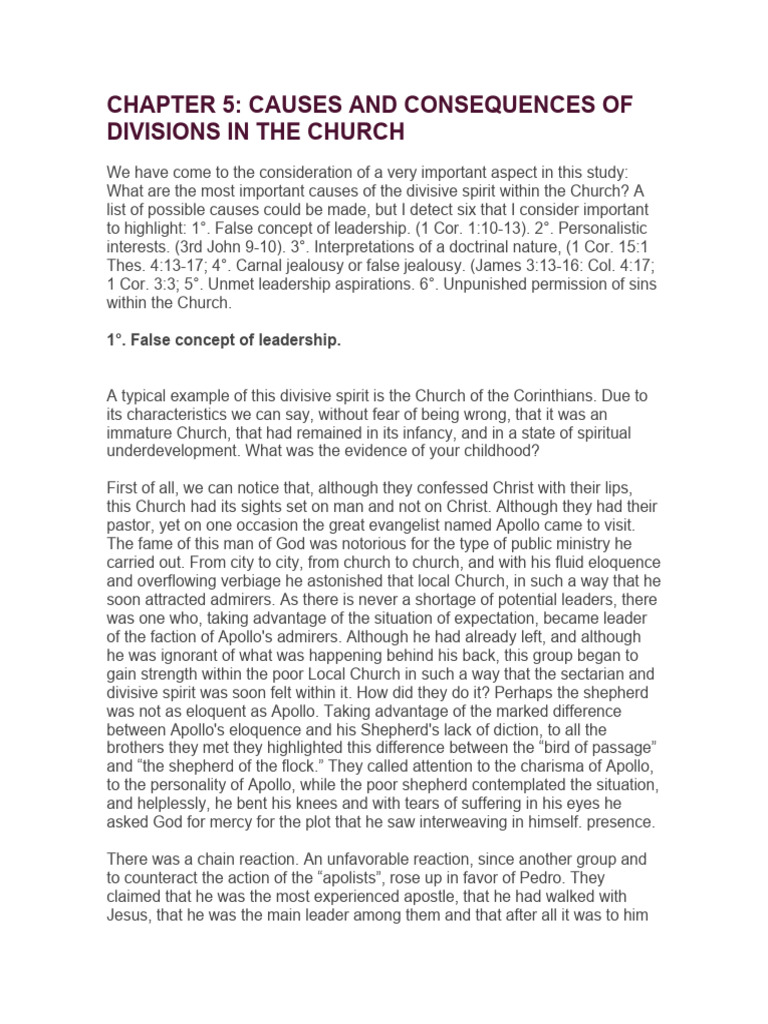In the pursuit of understanding the Bahá’í teachings, particularly regarding the causes of difference and division, one must embark on an exploration of both the philosophical underpinnings and their manifestations in contemporary society. The Bahá’í Faith emphasizes unity, encouraging adherents to recognize the oneness of humanity. Yet, contrasting views often lead to discord. This discourse delineates the principal causes of division and outlines a pathway toward healing these rifts.
1. The Nature of Human Differences
Humanity is inherently diverse, an amalgamation of varied cultures, beliefs, and experiences. This diversity is celebrated within Bahá’í teachings as a source of enrichment, yet it can also precipitate misunderstandings and conflict. To appreciate this complexity, one must recognize the multidimensional aspects of human identity. Factors such as ethnicity, socio-economic status, and religious affiliation contribute significantly to differing perspectives. The Bahá’í Faith advocates for an appreciation of this diversity, urging followers to view differences not as barriers, but as opportunities for collective growth.
2. Historical Contexts of Division
Throughout history, religious divisions have engendered profound schisms. These divisions often stem from misconstrued interpretations of sacred texts or dogmatic adherence to creeds. The Bahá’í teachings assert that the essence of all religions is unified; however, the advent of sectarianism has frequently led to hostilities. The examination of historical precedents reveals that conflicts rooted in religion can often disguise deeper socio-political tensions. Thus, a comprehensive understanding of these contexts is critical for addressing contemporary divisions.
3. The Role of Prejudice
Prejudice stands as a formidable barrier to unity, frequently manifested in the form of biases based on race, religion, gender, or nationality. The Bahá’í perspective emphasizes the destructiveness of prejudice, asserting that it undermines the fabric of society. Healing from this ailment necessitates concerted efforts at the individual and collective levels to dismantle stereotypes and cultivate empathy. Educational initiatives that foster awareness and understanding among disparate groups can play a pivotal role in mitigating prejudice.
4. Language and Communication
Language serves as both a bridge and a barrier in human interactions. Miscommunication, often arising from linguistic differences or cultural misunderstandings, can exacerbate divisions. The Bahá’í Faith places a premium on effective communication as a tool for unity. Cultivating active listening skills, alongside promoting clarity in expression, can significantly reduce misunderstandings. Moreover, fostering environments where individuals feel safe to express their thoughts and feelings may facilitate essential dialogues that transcend barriers of communication.
5. The Spiritual Dimension of Unity
From a Bahá’í perspective, the pursuit of unity involves not merely intellectual acceptance but also a profound spiritual transformation. Engaging with the divine principles espoused by Bahá’u’lláh, one can cultivate a sense of interconnectedness that transcends material differences. Meditation and prayer serve as avenues for deepening one’s spiritual understanding, fostering a sense of oneness with humanity. This spiritual foundation becomes indispensable for navigating and healing the divisions within society.
6. Engaging with Conflict
Conflict is an inevitable aspect of human relationships. However, the Bahá’í teachings propose that engaging with conflict constructively is crucial for healing divisions. Rather than approaching disagreements with animosity, followers are encouraged to adopt attitudes of humility and openness. Problem-solving strategies, including mediation and collaborative dialogue, can transform conflict into opportunities for mutual understanding. The practice of forgiveness, as articulated in Bahá’í scriptures, further aids in reconciling differences, allowing for the mending of fractured relationships.
7. Community Building and Collaboration
Strong communities are foundational to the Bahá’í vision of an integrated society. Collaborative efforts aim not only to address divisive issues but also to foster environments of trust and solidarity. Engaging in community service projects, interfaith dialogues, and cultural exchanges can fortify bonds among diverse groups. Such initiatives cultivate a shared sense of purpose and reinforce the belief in collective advancement. By working together towards common goals, communities can bridge gaps and dispel the schisms that divide them.
8. Education as a Transformative Force
Education is heralded as a powerful catalyst for change within Bahá’í tenets. A robust education system that emphasizes ethical principles and critical thinking can equip individuals to challenge prejudicial views and embrace diversity. The promotion of universal education is essential for empowering marginalized communities and fostering inclusive societies. By instilling values of unity and cooperation in future generations, the Bahá’í community envisions a world where differences become a source of inspiration rather than division.
9. The Global Perspective
The Bahá’í teachings advocate for a global perspective, promoting the concept of world citizenship. This outlook necessitates a commitment to addressing global issues—such as climate change, economic disparity, and warfare—that exacerbate divisions. Followers are urged to engage with these challenges collaboratively across national and cultural boundaries. Fostering an inclusive global community requires recognizing our shared responsibilities and aspirations in an increasingly interconnected world.
10. Conclusion: The Path to Healing
Healing the divisions that plague humanity is an ongoing journey, one that requires persistent effort and commitment to the principles espoused by the Bahá’í Faith. By embracing diversity, cultivating respectful dialogue, and engaging in community-building efforts, individuals can contribute to the collective vision of a united humanity. In navigating the complexities of difference and division, one must remain steadfast in the pursuit of knowledge, understanding, and compassion, paving the way for a harmonious and equitable global society.
